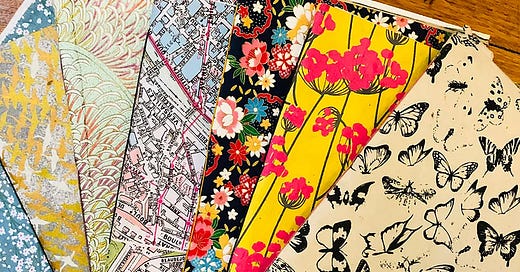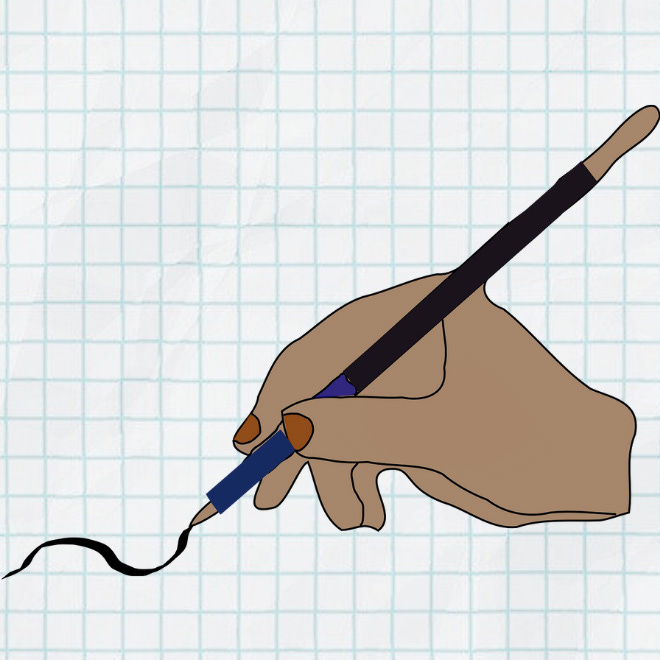Handmade notebooks can help you push past your creative blocks. (Notebooks and photo by Jillian Hess)
Even the great Sir Paul McCartney struggled with creative block. Luckily for us, he applied his creative genius to solving this problem. He invented alter-egos: characters that show up to help him work on his paintings. For example, he's got Mr. Blendini who enjoys blending paint together. And then there's Luigi, who owns a small Italian restaurant with an alcove that needs painting. Whenever McCartney feels blocked, he'll think to himself, "well, it's only for Luigi." Here’s how he explains it:
I’ve got some ways around blocks. I’ve got these little alter-ego people who help me through these dark moments….I’ve got certain people who help me out. There’s a Mr. Blendini who’s very helpful…he likes to blend paint. He likes colors to go into each other. So I can spend hours with him… I love him. And then there’s another friend of his who’s called Luigi. He’s a guy with a restaurant and in his restaurant he’s got an alcove and he always wants a picture for his alcove… So when it’s all going horribly wrong…I go, it’s only for Luigi’s alcove.
(You can watch Paul McCartney’s interview on his painting process here.)
McCartney has helped me come up with my own friendly alter-egos. For example, I’ve got a character named Ms. Quotini (in honor of Mr. Blendini). Ms. Quotini loves to collect quotes. She'll open her notebook and write out the most interesting lines from whatever book she's reading. Eventually, I'll start to notice a pattern forming. And then I start writing! My version of Luigi is my writing group. Writing for an anonymous audience can be difficult. So, I just imagine that I’m writing an essay for them—they’re all very kind, very generous readers.
So, here’s my prompt for you:
Come up with friendly writing alter-egos to help you through your creative blocks.
Find a way to focus on something very small (like blending colors together or collecting quotations) or imagine a situation where the stakes are very low (like painting for Luigi or for a friendly writing group).
If you enjoy exploring writers’ notebooks and note-taking practices, I invite you to subscribe to my Substack newsletter, Noted. Every week, I send a newsletter focused on a particular note-taker with an overview of their note-taking life, inspiring quotes, archival photos, and meditations on what I’ve learned from their notes.
Don’t miss my upcoming live Zoom conversation with Helen Sword on “Writers and Their Notebooks,” coming up on Wednesday, November 15 from 3-5 pm EST. You can register for this free event here.
Jillian Hess, author of Noted
For more scholarly writing inspiration, check out these resources from the curators of #AcWriMoments:
ScholarShape by Margy Thomas
WriteSPACE by Helen Sword









So clever to have different alter-egos assigned different purposes! Thanks for this prompt, Jillian. ✨ I’m going to take a closer look at my internal conversations and see how I can experiment with “fictional” alter-egos in them. When I’m writing, I often ask (imaginary versions of) my favorite authors for advice -- one advises me on tone, another on plot and characterization, and several others on substantive / content questions. But, of course there’s ambiguity about whether their guidance is what the actual real human versions of the authors would say if I met them in the world outside my imagination. Playing with fictional alter-egos is such a fun idea, and seems like it would be useful for taking ownership of your own voice and authorship. (And it also seems like it could be a useful exercise for developing fictional characters for storytelling purposes!)
Gillian, your wonderful post made me realise how much I wish I could transform all my anonymous Substack readers out there -- if anyone is actually reading my newsletter, it's hard to know! -- into a collective version of Paul McCartney's Mr Luigi, friendly and benign and easy to please with my imperfect efforts. The solution, as usual, comes from my dog Freddie: "It's okay, I'm just writing this newsletter for Freddie, and he loves everything I do!"